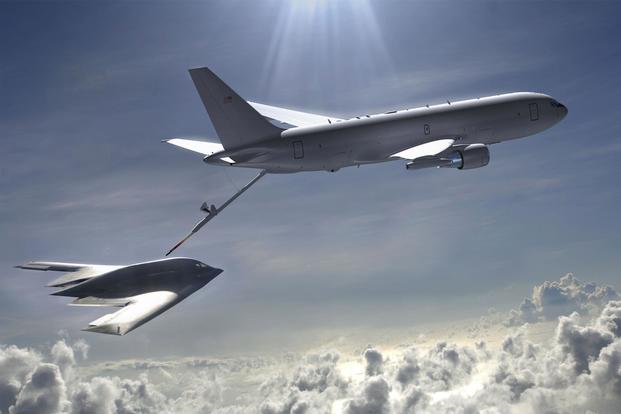As members of Congress, oversight committees and auditors have predicted, the Air Force's newest tanker will be late.
The KC-46 Pegasus won't hit base flightlines until the latter part of 2018, the service confirmed in a statement Tuesday.
"The Air Force and Boeing will continue to execute the program to Boeing's schedule," Air Force spokeswoman Capt. Emily Grabowski said in an email. "However, the Air Force assesses first aircraft delivery is more likely to occur in late calendar year 2018."
Related content:
- KC-46 Refueling Tanker Faces More Delays, Auditors Say
- Air Force's Future Tanker Sees Rising Cost Overruns
- Congress Questions Air Force One's Lack of Refueling Capability
"This assessment is based on known risks and predicted impacts associated with airworthiness certifications and slower than expected flight test execution," Grabowski continued. "The Air Force will continue to work with Boeing to develop schedule mitigations, where appropriate, to expedite the program."
She added, "These potential delays will not result in additional program cost to the taxpayer."
Last March, the Government Accountability Office, the investigative arm of Congress, issued a report saying the air refueling tanker would likely face more delays due to additional testing needed from Boeing Co., the aircraft's manufacturer. The plane at the time was already 14 months behind schedule.
"GAO's analysis shows there is risk to the current delivery schedule due to potential delays in Federal Aviation Administration certifications and key test events," the report said.
"Boeing must also complete over 1,700 test points on average for each month from February to September 2017, a level that is more than double what it completed in the last 11 months," it said.
Boeing was supposed to deliver the initial 18 aerial refueling planes by August 2017. With ongoing snafus throughout the program since its start in 2013, such as initial design problems in its refueling boom, Boeing and Air Force officials said the first delivery would be in February 2018 at the earliest.
In its report, GAO said the first delivery is more likely to come in October 2018, if that.
A silver lining may be that the program's total acquisition cost estimate has "decreased about $7.3 billion, or 14 percent, since the initial estimate," the 2017 report said, even though the program has suffered cost overruns -- all at Boeing's expense.
The Air Force awarded Boeing a fixed-price $4.9 billion contract in 2011. The company is responsible for any cost overruns.
In its fiscal 2019 budget request, the Air Force said it wants to purchase 15 more KC-46 refueling tankers, on par with last year's request. Boeing plans to build 179 tankers total for the service.
The Air Force hopes to retire part of its legacy aerial refueling fleet, such as the 60-plus-year-old KC-135 Stratotanker, and grow with the new Boeing-made fleet to meet its 479-tanker requirement.
The Pegasus is expected to replace some current tanker fleets at bases such as Joint Base McGuire-Dix-Lakehurst, New Jersey, and Travis Air Force Base, California.
But without a solid timeline for when the first KC-46 may be delivered, the Pegasus won't even begin to join the Air Force's fleet until at least 2019.
-- Oriana Pawlyk can be reached at oriana.pawlyk@military.com. Follow her on Twitter at @Oriana0214.










